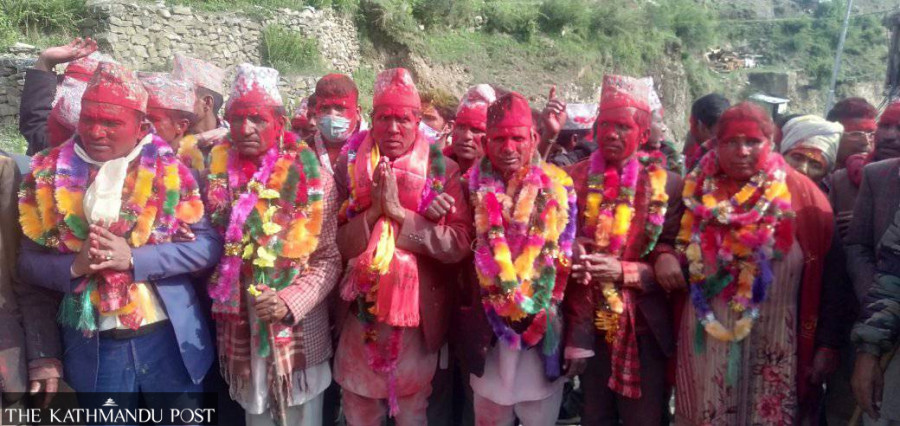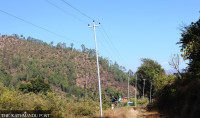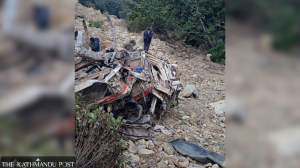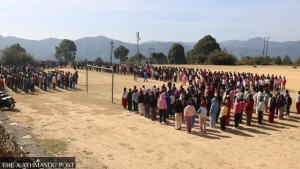Karnali Province
Constantly spurned, how Dalits united to create history in local elections
A team of independent Dalit candidates wins four out of five seats in Ward 8 of Kanakasundari Rural Municipality in Jumla, including the post of chair.
DB Budha
Dhan Bahadur Kami had been a CPN-UML member for years. When a group split the party and formed CPN (Unified Socialist), he had an opportunity to join the new force. But he stayed with the UML. When local elections neared, he was hopeful that his party would field him as a candidate.
But it did not.
The 50-year-old man then decided to contest the election on his own. He held consultations in his community. The Dalit settlement of Ward 8 in Kanakasundari Rural Municipality in Jumla rallied behind him. He then decided to form a team of candidates. He won the ward chair post. And along with him, three of his team members also won.
“All the major parties are active here. But when it comes to fielding Dalits for key posts, no one is interested,” said Dhan Bahadur of Rokayabada. “And none of the representatives elected from the last elections worked for the uplift of Dalits. So our whole settlement decided to contest the elections on our own.”
Dhan Bahadur secured 288 votes to defeat Kaptan Bahadur Shahi of the Nepali Congress who garnered 220 votes. Gol Damai and Karnajit Sarki were elected ward members while Chanakhi Kulal was elected Dalit female ward member.
There are eight villages in Ward 8 of Kanakasundari Rural Municipality—Sanjyalbada, Sumal Gaun, Kulalbada, Rokayabada, Bhatta, Bhandaribada and Pausera. Of them, Sanjyalbada, Sumalgaun and Kulalbada have a Dalit majority population. The three villages have around 225 households with Dalit residents.
Ward 8 is a remote area which lacks education, development and health facilities. And caste-based discrimination is rife.
Chuna Kami, a local Dalit woman from Ward 8, said life is an everyday struggle for people from her community, starting from fetching water.
“Even our cremation grounds have now been taken over by non-Dalits, robbing us of our right to even cremate our dead with dignity,” said Chuna.
After a specific law against untouchability and the constitution explicitly speaking for Dalit rights, there were hopes in ward 8 also, like in other parts of the country, that casteism would end, according to Chuma, 40.
“But Dalits rarely got the opportunity to be part of the development committees in villages,” said Chuna, a farmer. “Leaders in the past said they would work for the betterment of the people like us, but they never included us in plans and programmes meant for us.”
Chuma, who has strong resentment against politicians, said parties used the Dalits from the villages just as “votes”. Now that ward chair and other members from her community have been elected, she is happy and hopeful.
Article 24 of the constitution says no person shall be subjected to any form of untouchability or discrimination in any private and public places on grounds of his or her origin, caste, tribe, community, profession, occupation or physical condition. Similarly, the Nepal parliament passed a bill in 2011 to enact a law— Caste-Based Discrimination and Untouchability (Offence and Punishment) Act, 2068 (2011).
Caste-based discrimination, however, continues in Nepal, even in urban areas including Kathmandu.
UML’s candidates had won the ward seats in the last local elections in 2017.
The Dalit community had supported non-Dalits in the elections hoping that they would deliver on their promises. But the change they sought did not happen even after five years.
“The parties look down on us. They think they can buy us off during elections,” said Dhan Bahadur, the newly elected ward chair.
After the local elections in 2017, the Dalit community had asked for the construction of a bridge over the Hima River but the bridge is yet to be built.
“The villages do not have proper roads and drinking water facilities,” said 35-year-old farmer Birman Kami, from Rokayabada. “We have struggled to even get access to basic amenities in the villages because of our caste.”
Prosperity for all has never been achieved in the villages with a large Dalit population because of a lack of Dalits in decision-making roles. Before the recent turn of events, the political leaders played with the sentiments of Dalits and engaged in divisive politics, according to Birman.
“Dalits have had to suffer because of a lack of unity,” said Birman. “This time we showed up in strength and ensured that our voices were heard.”
Dhan Bahadur, who has got five years in hand, appears determined to work for the entire population of the ward.
“We will develop our settlement and are determined to solve all the social as well as developmental issues Dalits have been facing,” said Dhan Bahadur who is literate but has no formal education. “From now on, both Dalits and non-Dalits will have equal access to all development programmes.”
He sees this election victory as an opportunity for government plans, policies and funds to reach the beneficiaries directly.
“Earlier, the funds that came in the name of Dalits were never used for the benefit of the target population,” he said. “Now we will have direct access to all government plans, policies and programmes meant for the development of our community.”
The local unit with Dhan Bahadur at the helm aims to build two drinking water tanks, a bridge over the Hima river, a school, a health post and a temple where people of all castes will be allowed.
“We will soon call a local meeting with the villagers. We are poor and we are Dalits but now I am confident that we will work our way towards prosperity and equality,” said Dhan Bahadur. “We will build a school in the village and a health post too. Our people have suffered enough. We aim to put an end to the sufferings.”
Jase Kulal, a 46-year-old Dalit man from Rokayabada, has high hopes from the newly elected local representatives.
“I hope for transparency in governance and equality for all from the new representatives,” said Kulal. “They must work for prosperity for all.”




 18.12°C Kathmandu
18.12°C Kathmandu













